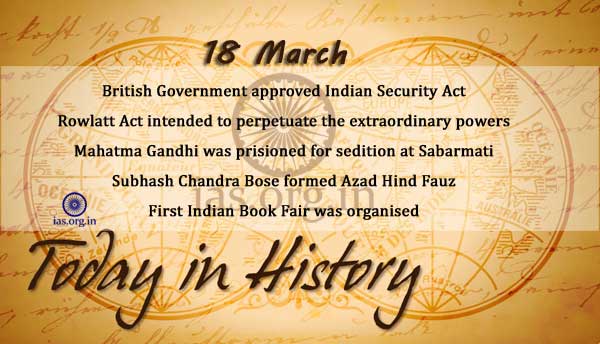1896
Pandit Kunjilal Dubey, freedom fighter, educationalist and politician, was born at Amgaon, District Narsinghpur.
1915
British Government approved Indian Security Act to have greater control on the Indian people.
1919
Rowlatt Act, intended to perpetuate the extraordinary powers enjoyed by the Government under Lord Chelmsford during the war, provokes countrywide protests. This Rowlatt Act was forced instead of 1915 Indian Security Act which reduced freedom of Indian people.
1922
Mohandas K. Gandhi “”Mahatma,”” the great spirit, sentenced by British authorities to six years in prison for sedition at Sabarmati. Gandhi was sentenced just eight days after he was arrested. The British acted hastily after government officials in London and India were criticized for not arresting him sooner. In London, the Secretary of State for India was forced to resign because of the controversy over Gandhi. In India, the arrests of Gandhi and other Indian nationalists had only increased sympathy.
1944
Subhash Chandra Bose formed Azad Hind Fauz and took control of Kohima-Imphal.
1944
Azad Hind Fauj entered India (Japanese army) from the border of Burma and invaded north eastern India.
1948
Socialist Party of India (SPI) disassociates itself from the Congress.
1953
Backward Classes Commission inaugurated.
1972
First Indian Book Fair was organised by National Book Trust in New Delhi.
1996
President confers gallantry awards on 65 personnel of the defence forces.
1997
Indo-Bangladesh friendship treaty, signed 25 years ago, expires.
1998
A.B. Vajpayee, the Prime Minister-designate, releases the ‘national agenda for governance’ in New Delhi. It is silent on the Ram temple issue, scrapping of Article 370 and a uniform civil code.
Related Articles:


